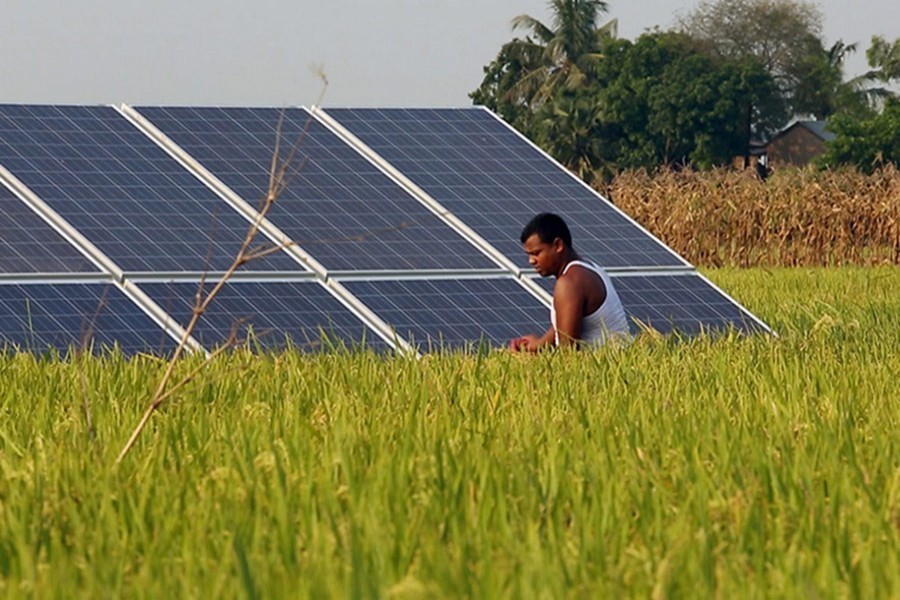Bangladesh has set a goal of generating 40 per cent of electricity from renewable sources in the next 20 years, but a roadmap on how to reach that lofty target is absent.
The government has adopted a mega plan on power: to boost electricity production to 60,000 MW by 2041 with renewable energy's share rising to 24,000 MW, which now stands at 700 MW.
Energy experts and stakeholders in the green energy sector believe a comprehensive and inclusive roadmap is necessary to reach the target of 24,000 MW of electricity from renewable sources in the next 20 years.
State Minister for Power, Energy and Mineral Resources Nasrul Hamid unveiled the government's latest vision on renewable energy during a Bangladesh-UK Climate Partnership Roundtable on June 2 in the city.
President of COP26 Alok Sharma, Foreign Minister AK Abdul Momen, and Environment, Forest and Climate Change Minister Shahabuddin Uddin were present at the function.
Earlier, Bangladesh had set a plan to generate 10 per cent of electricity from renewable sources by 2020. But it could raise it nearly 3.0 per cent only.
Data available from the Sustainable and Renewable Energy Development Authority (SREDA) shows the country now generates 730 MW from renewable sources, including solar, wind and hydro.
About the new target, Nasrul said he is confident of achieving the goal as the government is determined to do this as part of its commitment to the Climate Vulnerable Forum (CVF) where Bangladesh is the chair.
"We've already awarded a good number of contracts in public and private sectors for renewable energy plants which will cover 15 per cent while the country is trying to import hydro electricity from Nepal and Bhutan," he said.
"A deal is ready to be signed with Nepal for importing 700 MW hydro power from Nepal while negotiations are on with Bhutan to import hydro power from the Himalayan nation," he claimed, adding that if such moves become successful it would hugely boost the country's renewable energy generation.
Nasrul thinks the technologies on green energy are changing so fast that no long-term plan should be followed.
"Instead, the country should work out a short-term plan for two or five years as a dynamic one to adopt new technologies," he told UNB.
Nasrul said the new target will be aligned with the next Power System Master Plan (PSMP).
The CVF countries pledged to transit to 100 per cent renewable energy by 2050. It was made at the 22nd Conference of Parties (COP22) of the United Nations Framework Convention on Climate Change (UNFCCC) in 2016.
Experts believe that Bangladesh's 40 per cent renewable energy goal is impossible to achieve provided there is a detailed plan.
They said there are various sources of renewable energy like rooftop solar, floating solar, ground mounting solar, hydro, wind, bio-gas, biomass and ocean waves.
"We should have a roadmap to define how much we want to harness from which sources for better implementation of the plan," said Dipal Barua, President of Bangladesh Solar and Renewable Energy Association (BSREA), a platform of the private firms involved in renewable energy business.
Agreeing with him, Munawar Misbah Moin, President of Solar Module Manufacturers Association of Bangladesh (SMMAB), said it is very encouraging that the government set a target for generating 40 per cent electricity from renewable sources in line with the global trend towards green energy for achieving a zero-emission target.
"But any goal needs a comprehensive roadmap involving the private sector players beside the public sector," he said, adding that there must be a year-wise budget and financial planning to implement a mega plan which needs a billion-dollar investment.
Eminent energy expert Dr M Tamim said the country's plan on the power and energy sector should be short-term and home-grown one instead of following a third-country model.
SREDA statistics shows that the country's current production of 700 MW renewable energy is now coming from different sources as the PV solar leads the sector with 466.68 MW generation capacity, while it is followed by hydro with 230 MW capacity, 2.9 MW from wind, 0.63 MW from Bio-gas and 0.4 MW from Biomass.
Official sources at Power Division said in the current Power System Master Plan (PSMP) 2016, a total of 36 grid-connected solar park projects of total 2110.65 MW capacity were drawn up to implement in public and private sectors in the last 5-6 years.
But only five projects have been implemented so far although contracts were awarded to 26 projects.
The five implemented projects having total capacity of about 88.5 MW, are 50 MW Gauripur, Mymensingh, 7.5 MW Kaptai, 8 MW Panchagarh, 20 MW Teknaf, and 3 MW Sharishabari solar parks.
SREDA Chairman Mohammad Alauddin said renewable energy is now passing its take-off point.
He informed that the country's 100-year Delta Plan, which is now at the drafting stage, envisions implementing different projects to reach renewable energy's generation to 30,000 MW.


